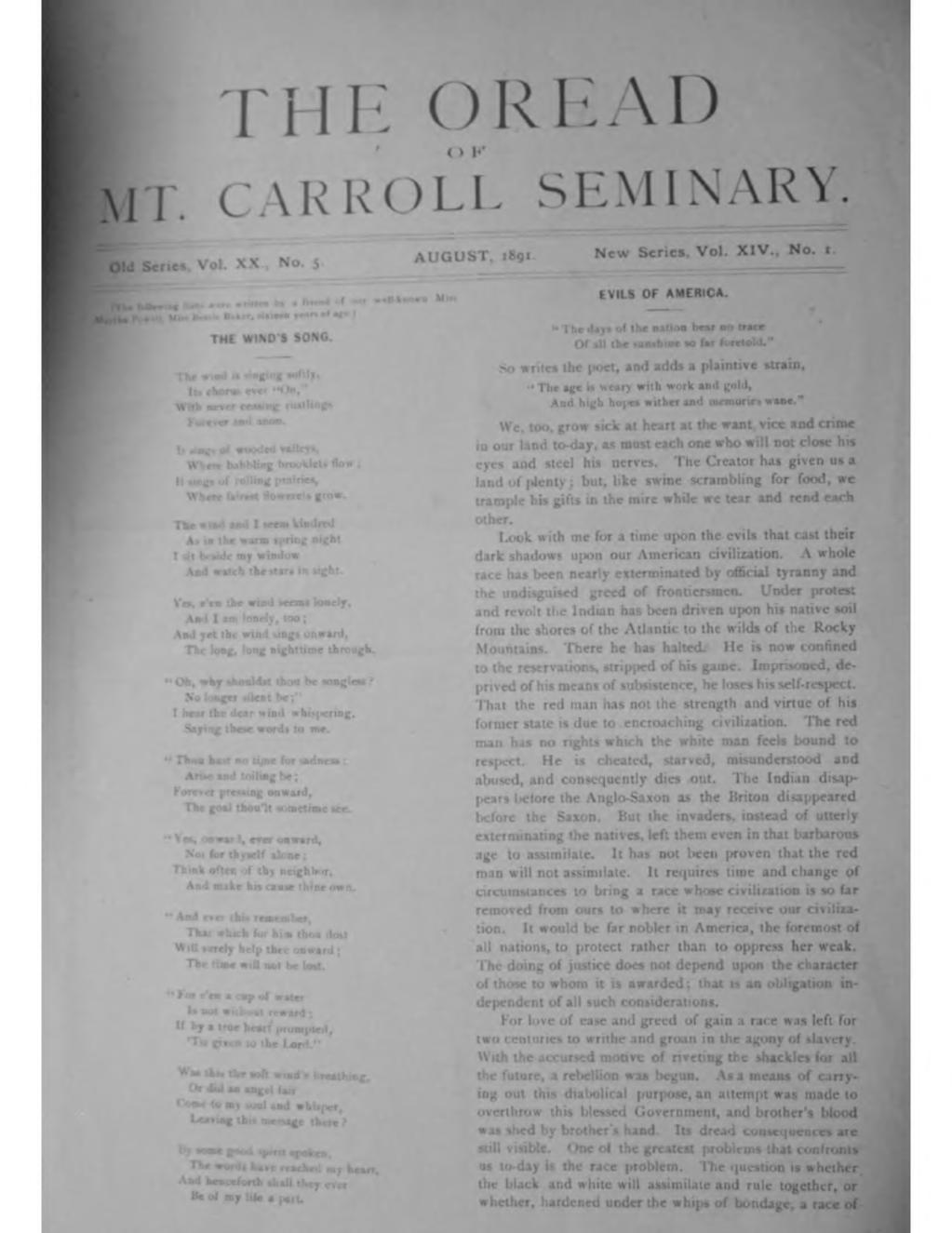THE 0READ
of
MT. CARROLL SEMINARY.
Old Series. Vol. XX No. 5 AUGUST, 1891 New Series. Vol. XIV, No. 1
[The following lines were written by a friend of our well-known Miss Martha Powell, Miss Bessie Baker, sixteen years of age.]
THE WIND'S SONG.
The wind is singing softly,
Its chorus ever "On,"
With never ceasing rustlings
Forever and anon.
It sings of wooded valleys,
Where babbling brooklets flow;
It sings of rolling prairies,
Where fairest flowers grow.
The wind and I seem kindred
As in the warm spring night
I sit beside my window
And watch the stars in sight.
Yes, e'en the wind seems lonely,
And I am lonely, too;
And yet the wind sings onward,
The long, long nighttime through.
"Oh, why shouldst thou be songless?
No longer silent be;"
I hear the dear wind whispering,
Saying these words to me.
"Thou hast no time for sadness:
Arise and toiling be;
Forever pressing onward,
The goal thou'lt sometime see.
Yes, onward, ever onward,
Not for thyself alone;
Think often of thy neighbor,
And make his cause thine own.
"And ever this remember,
That which for him thou dost
Will surely help thee onward;
The time will not be lost.
"For e'en a cup of water
Is not without reward
If by a true heart prompted,
'Tis given to the Lord."
Was this the soft wind's breathing,
Or did an angel fair
Come to my soul and whisper,
Leaving this message there?
By some good spirit spoken,
The words have reached my heart,
And henceforth shall they ever
Be of my life a part.
EVILS OF AMERICA.
"The days of the nation bear no trace
Of all the sunshine so far foretold."
So writes the poet, and adds a plaintive strain,
"The age is weary with work and gold,
And high hopes wither and memories wane."
We, too, grow sick at heart at the want, vice and crime in our land to-day, as must each one who will not close his eyes and steel his nerves. The Creator has given us a land of plenty; but, like swine scrambling for food, we trample his gifts in the mire while we tear and rend each other.
Look with me for a time upon the evils that cast their dark shadows upon our American civilization. A whole race has been nearly exterminated by official tyranny and the undisguised greed of frontiersmen. Under protest and revolt the Indian has been driven upon his native soil from the shores of the Atlantic to the wilds of the Rocky Mountains. There he has halted. He is now confined to the reservations, stripped of his game. Imprisoned, deprived of his means of subsistence, he loses his self-respect. That the red man has not the strength and virtue of his former state is due to encroaching civilization. The red man has no rights which the white man feels bound to respect. He is cheated, starved, misunderstood and abused, and consequently dies out. The Indian disappears before the Anglo-Saxon as the Briton disappeared before the Saxon. But the invaders, instead of utterly exterminating the natives, left them even in that barbarous age to assimilate. It has not been proven that the red man will not assimilate. It requires time and change of circumstances to bring a race whose civilization is so far removed from ours to where it may receive our civilization. It would be far nobler in America, the foremost of all nations, to protect rather than to oppress her weak. The doing of justice does not depend upon the character of those to whom it is awarded; that is an obligation independent of all such considerations.
For love of ease and greed of gain a race was left for two centuries to writhe and groan in the agony of slavery. With the accursed motive of riveting the shackles for all the future, a rebellion was begun. As a means of carrying out this diabolical purpose, an attempt was made to overthrow this blessed Government, and brother's blood was shed by brother's hand. Its dread consequences are still visible. One of the greatest problems that confronts us to-day is the race problem. The question is whether the black and white will assimilate and rule together, or whether, hardened under the whips of bondage, a race of
